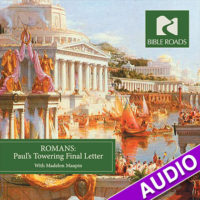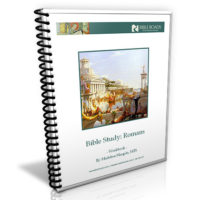Discovering the variety of ways Paul opens his letters to the early Churches is like mining fields of gold—so many gems to uncover, chew on, then figure out how to apply and his introduction to Romans is no exception.
Paul launches his monumental epistle to the Romans with a self-description. That alone is a spiritual aha. If we were writing a church to share an important message, how would we introduce ourselves? Some might try to impress with academic credentials; others with work experience, or family pedigree — something that would make the listener be impressed so they would sit up and take note. But not Paul.
He does use self-description, but only in relation to Christ and God: “Paul, a servant of Jesus Christ, called to be an apostle, set apart for the gospel of God” … (Rom. 1:1). This is not only how Paul knew himself, but how he wanted others to know him – and perhaps how he wanted them to know themselves as well.
This introductory phrase is Paul’s version of self-knowledge, but with a decided Christian stamp. Perhaps Paul was indirectly teaching his readers and listeners — then and now – that the well-known Plato maxim to ‘know thyself’ (attributed to the character of Socrates in Plato’s Dialogues) needed to be interpreted in a completely new way, based on one’s knowledge of and relationship with Christ Jesus. By introducing himself this way, to a Roman church group where he had never been and knew few personally, Paul models how they (and we, by extension) need to know ourselves if we too want to build a life of significance and service.
Paul never describes his physical person in his introduction to Romans – height, coloring, physique, or even his psychological or emotional profile. Instead the Apostle measures himself by how totally he has given over his life to Christ Jesus, exactly as a Roman slave would to his master. ‘Doulos’ is Greek for ‘slave’. While it’s sometimes translated ‘servant’, conjuring up the starched uniforms of a Downton Abbey period, it is more accurately, ‘slave’.
For a social institution known for its cruelty, ‘slave’ seems an odd choice until realizing, as first century Roman citizens and slaves would know, slavery is primarily about authority and submission, the absolute control of one over another. It was to this authority of Christ Jesus that Paul submitted — initially on the Damascus Road, then probably daily and hourly for the rest of his life. How do we submit to the authority of Jesus Christ? What does that mean and look and feel like? These could provide a rich discussion for those studying Romans in a Bible Study group. (And if you choose to take them up, please let us know about the outcomes of your discussion).
Paul’s second self-description, ‘called to be an apostle’, creates the stepping stone for the third, “set apart for the gospel of God”. This is not Paul’s personal story he tells, shares and preaches but The Story–God’s story of salvation for all humanity, through Christ Jesus who proved life, not death, was the reward of the faithful. Thus, Paul so clearly calls his message, ‘the Gospel of God’.
Here is The Story that supersedes all others, whether tales of patriarch or prophets. Just in this opening verse we have moved onto holy ground from which all sandals must be removed. And we are in this great unfolding drama that continues, God’s Gospel, the news of how every man, woman and child is loved by God so much that He provided a savior for the world.





So many of these passages are so familiar that I can tend to gloss over when reading! I have always just skimmed those introductions as if they were a routine way of introducing an epistle and not how you describe it, as Paul giving us a definition of who he really is now, since his conversion and thereby, who he is telling us we need to be if we truly want to be called Christians. Wonderful to have light shed on these morsels. I won’t skim over those words ever again! Thank you…
I read in this that it is not who we are but who God made us to be, and that is the mission that I am following in my newly-found studies of the Bible and all the spiritual interpretations available. So, my journey goes on with God’s help and guidance.